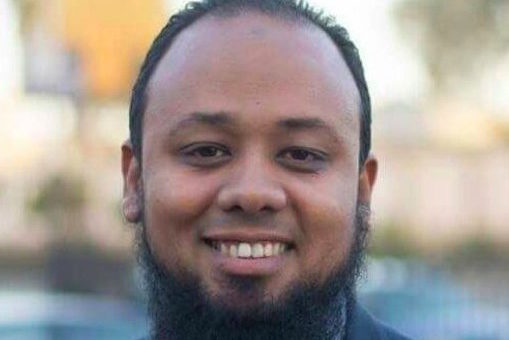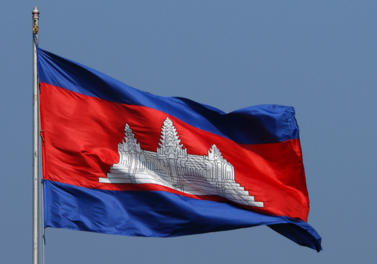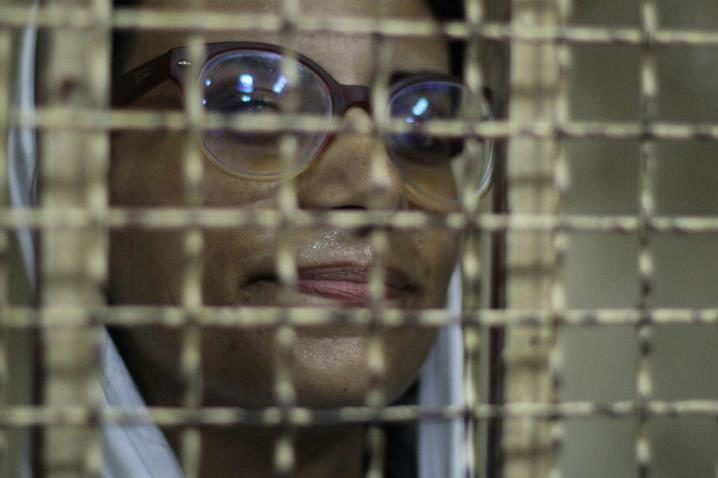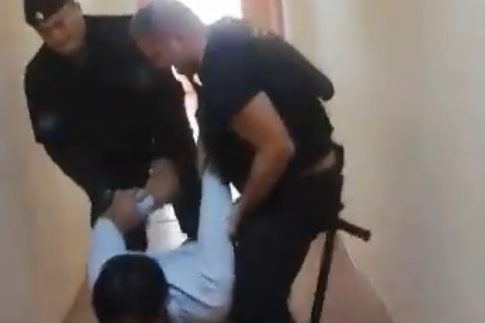
Oct 4, 2019 | News
The ICJ today called on the Egyptian authorities to immediately release all lawyers arrested for discharging their professional functions, and ensure they and other lawyers in the country are allowed to perform their work without threats or intimidation.
The Egyptian authorities have arrested more than 2400 people over the past two weeks following anti-government protests.
Many of the detainees’ lawyers have themselves been arrested, including Mahienour Al-Massry, Sahar Ali, Mohamed Salah Ajaj, Mohamed Al-Baqer (photo), Mohamed Helmy Hamdoun, Ahmed Sarhan, and Ahmed Abd El-Azim.
On 29 September, while representing prominent human rights defender Alaa Abdelafttah during questioning before the State Security Prosecution, lawyer Mohamed Al-Baqer was arrested and charged with, among other charges, “spreading false information aiming at disturbing the public and peaceful order” and “joining a terrorist organization.”
The ICJ has previously documented how lawyer Mahienour Al-Massry was arrested under similar circumstances, and called for her immediate release.
Mahienour was also charged with “spreading false information” and “joining a terrorist organization.”
“By arresting lawyers and prosecuting them on trumped-charges, the Egyptian military is dismantling the very last line of defense against its ruthless crackdown on human rights and fundamental freedoms, and silencing the very same voices that can still witness, challenge and report on its industrial-scale human rights abuses,” said Said Benarbia, ICJ MENA Director.
Under international standards reflecting core rule of law principles, lawyers must be able to discharge their professional functions without hindrance, harassment or improper interference.
They shall not suffer, or be threatened with prosecutions for any action taken in accordance with their professional duties.
The ICJ emphasized that these standards are there not only for the interests of the lawyers and those they represent or might in the future represent, but also to ensure that the rule of law remains operative for the society as a whole.
The Egyptian authorities must conform to these standards, refrain from its attacks against the legal profession, and immediately release all lawyers and other individuals arbitrarily detained.
Contact:
Said Benarbia, Director of the ICJ Middle East and North Africa Programme, t: +41-22-979-3817; e: said.benarbia(a)icj.org
Egypt-Attacks on Lawyers-News-web stories-2019-ARA (story in Arabic, PDF)

Oct 4, 2019 | News
Today, the ICJ and 36 other civil society organizations called on the Government of Cambodia to drop charges against former Radio Free Asia (RFA) journalists Yeang Sothearin and Uon Chhin, who are being tried on spurious charges for multiple offences in connection with carrying out their journalist functions.
This comes after the latest hearing in the case yesterday by the Phnom Penh Municipal Court, where it postponed delivery of its verdict for a second time. The Court has now ordered that the case be returned to a new investigating judge for a reinvestigation.
The case is emblematic of a pattern of instances where journalists, human rights defenders, community activists, members of the political opposition and others have been subjected to intimidation and harassment for exercising their fundamental freedoms through misuse of laws and the judicial system.
The ICJ and other organizations have called for a cessation of this practice and urged the government to comply with their obligations under international law to protect these freedoms.
The trial of the two journalists which concluded on 9 August, had initially been expected to result in a verdict on 30 August, before it was postponed until yesterday’s hearing, when it was again postponed.
“These charges should have never been brought against Yeang Sothearin or Uon Chhin – They were brought with the sole purpose of silencing their work as journalists and chilling other independent voices in the country from speaking,” said Frederick Rawski, ICJ’s Asia and Pacific Regional Director.
The ICJ has stressed that the case against journalists does not comply with Cambodia’s international legal obligations to respect the right to liberty and to a fair trial.
“Given the arbitrary legal bases upon which the journalists have been charged and tried, the prolonging of their case prolongs this harassment and additionally violates their right to be tried without undue delay,” said Rawski.
In November 2017, Yeang Sothearin and Uon Chhin were arrested and detained in Prey Sar prison before they were provisionally charged with “supplying a foreign state with information prejudicial to national defence” under Article 445 of Cambodia’s Criminal Code. In March 2018, they were further charged with alleged production of pornography under Articles 38 and 39 of the Law on the Suppression of Human Trafficking and Sexual Exploitation.
Both men face up to 16 years in prison. They are currently under judicial supervision, following their release on bail after being held in pre-trial detention for more than nine months.
The journalists were arrested following the shutdown of RFA’s Cambodia bureau in the midst of a sharp deterioration in the situation for human rights and the rule of law in Cambodia prior to the 2018 national elections.
In September 2017, in a statement to the UN Human Rights Council, the ICJ had highlighted that civil society, independent media and the political opposition were under sustained attack in a “carefully orchestrated effort to silence dissenting voices in the lead up to national elections” and that laws were “being weaponized to this end”.
In October 2017, the ICJ in a report on the human rights situation similarly warned that the government was “relying on judges and prosecutors who lack independence to silence dissent and dismantle democracy” through “an endemic system of political interference in high-profile cases and an equally entrenched system of corruption in all others”.
Following the national elections, this trend has only worsened.
In August and September 2019, the ICJ and other organizations highlighted the “ongoing human rights crisis” in Cambodia and called for strengthened scrutiny at the Human Rights Council of the human rights situation in the country.
Download
Cambodia-charges against journalist-news-webstory-2019-ENG (full story in PDF)
Link to Joint Statement available here.
Contact
Frederick Rawski, ICJ Asia and Pacific Regional Director, frederick.rawski(a)icj.org

Sep 24, 2019 | News
The ICJ today called for the immediate release of lawyer Mahienour al-Massry and hundreds of peaceful protestors who have been arbitrarily arrested by the Egyptian authorities in the context of recent protests against government corruption and President Abdel Fattah al-Sisi.
On 22 September 2019, Mahienour al-Massry was arrested by plain-clothes police officers outside the Supreme State Security Prosecution headquarters in Cairo, after representing five detainees in judicial investigations.
The next day she was brought before the same Supreme State Security Prosecution on unknown charges.
The detainees represented by Al-Massry had been arrested during the recent protests against President Sisi, which commenced on 20 September 2019 when hundreds of Egyptians took the streets in Cairo, Alexandria, Damietta, Mahalla al-Kubra and Suez, among other cities.
Police responded by firing tear gas and arresting hundreds.
Media accounts indicate that nearly 500 people have been arrested, most or all arbitrarily, since the protests commenced. However, documentation by local NGOs indicates that as many as 800 people may have been arrested, apparently for “participating in a ‘terrorist group’ operation” and “distributing fake news to disturb the public opinion.”
“The Egyptian authorities must drop the charges against Mahienour al-Massry, promptly release her and immediately stop persecuting, intimidating and interfering with the work of lawyers protecting the rights of others,” said Said Benarbia, Director of ICJ’s Middle East and North Africa Programme.
Mahienour al-Massry was charged in 2013 and again in 2015 for taking part in peaceful protests, for each of which she received one year-long terms of imprisonment.
Mahienour al-Massry’s recent arrest constitutes an effective sanction that violates her right to liberty under article 9 of the International Covenant on Civil and Political Rights and UN Basic Principles on the Role of Lawyers.
It also impedes the right of her clients to legal representation under article 14 of the ICCPR.
The ICJ previously filed a submission to the Universal Periodic Review regarding arbitrary arrests and detentions and systematic use of pre-trial detention in Egypt, and documented the use of the Egyptian justice system as a repressive tool to eradicate political expression and human rights work.
“The systematic use of arbitrary arrest and detention by State authorities is one of the very reasons Egyptians took to the street in protest,” said Benarbia.
“The authorities’ response provides further evidence of the widespread violations of rights Egyptians face under the current regime,” he added.
Contact:
Said Benarbia, Director of the ICJ Middle East and North Africa Programme, t: +41-22-979-3817; e: said.benarbia(a)icj.org
Download:
Egypt-al-Massry-News-web stories-2019-ARA (story in Arabic, PDF)

Sep 20, 2019 | News
The ICJ has called on the Russian authorities to institute a thorough and independent investigation into the use of physical force against lawyer Dmitry Sotnikov by court officials and subsequently by the police on 12 September in two separate but linked incidents, and to hold accountable those responsible for the attacks.
The authorities should take effective measures to prevent such attacks in the future, and to ensure that lawyers are not prevented from representing their clients in accordance with law, the ICJ said.
“This use of physical force used against a lawyer solely because he tried to zealously defend his client is contrary to international human rights law and standards, including on the role of lawyers,” Temur Shakirov, Senior Legal Adviser of the ICJ Europe and Central Asia Programme said today.
“It is also of concern that Dmitry Sotnikov was not allowed to represent his client despite clear legal provisions under the law guaranteeing the right to independent legal advice and representation,” he added.
On 12 September, Dmitriy Sotnikov, a Moscow-based lawyer, came to Tula region to represent a client charged with drug trafficking in a hearing at the Novomoskovsk District Court.
Upon entering the courtroom, after having notified the judge that he would be 10 minutes late, Dmitriy Sotnikov reportedly announced that he represented his client Eduard Dolgintsev, presented his licence and a warrant of attorney; he was then told by the judge to sit down.
As he tried to ask one of the key witnesses a question, the judge told him she had never authorized his participation as a lawyer in the proceedings.
In response to this, Sotnikov referred to his rights of audience as a lawyer necessary to fulfill his duties as the legitimate legal representative of his client; however, the judge said Dmitriy Sotnikov was disturbing the court, ordered him to leave the courtroom, and then abruptly announced a recess.
After the recess, Sotnikov was blocked by a court officer from entering the court room. When he attempted to enter the room again, he was pushed face down by the officer and handcuffed.
Thereafter, he was detained by the police, taken to a drug treatment centre, purportedly to ascertain whether he tested positive for drug use, and then brought to the investigative department for questioning.
Reportedly, later that night, after having spent eight hours in the local department of the Investigative Committee without being officially registered, Dmitriy Sotnikov inquired whether he was officially in custody.
On being told that he was not, he attempted to leave and was reportedly again attacked, this time by investigators, who beat him on the head and slammed a door shut on his fingers.
Sotnikov’s lawyer, Svetlana Zavodtsova – who had arrived at the local department of the Investigative Committee to represent Dmitriy Sotnikov – was recording on video on her mobile phone which was taken from her by force while the video of the incident she had recorded was deleted.
The ICJ stresses that in order to fulfill their function lawyers must be able to act without fear and free from fear of reprisals of any kind.
“No justice can be delivered unless the parties to the court process are fully protected and lawyers are able to discharge their functions without harassment, or attack”, Shakirov added. It is now essential for the credibility of the judicial system that the assaults against Dmitry Sotnikov is promptly, thoroughly and independently investigated and that those responsible are brought to justice, the ICJ emphasized.
Additional information
The UN Basic Principles on the Role of Lawyers in its Article 19, specify that “[n]o court or administrative authority before whom the right to counsel is recognized shall refuse to recognize the right of a lawyer to appear before it for his or her client unless that lawyer has been disqualified in accordance with national law and practice and in conformity with these principles”.
Under Article 49.4 of the Criminal Procedure Code of the Russian Federation a lawyer is recognized as the legitimate legal representative of a defendant in a criminal case upon presenting her or his licence and a warrant of attorney; once this is done lawyers enjoy the rights of audience necessary to fulfill their professional duties.
Dmitriy Sotnikov has reportedly sustained injuries from both incidents, and is presently on sick leave undergoing medical treatment for the same.
The ICJ has previously raised concerns at violence and intimidations against Russian lawyers.

Sep 16, 2019 | Advocacy, News
Antonio Guterres should publicly condemn China’s widespread violations of the rights of its Muslim minority citizens, especially in Xinjiang Province, the ICJ demanded in a joint letter submitted along with Amnesty International, the International Federation for Human Rights (FIDH), Human Rights Watch, and the World Uyghur Congress.
The joint letter urged the UN Secretary-General to call for an end to widespread arbitrary detention of Muslim and minority communities through the immediate closure of Xinjiang’s ‘political education’ camps. Reports by the United Nations and human rights organizations have estimated that more than one million Muslims have been interned in extra-legal ‘political education’ detention camps.
“In the past few years, China’s violations in Xinjiang, including arbitrary detention, ill-treatment, pervasive surveillance and political indoctrination of Turkic Muslims, have intensified, and continue to worsen,” said Sam Zarifi, ICJ’s Secretary General.
“Quiet diplomacy has not worked. Mr. Guterres must exercise the full extent and power of his mandate as leader of the United Nations to demand and ensure protection of the rights of everyone in China, including all individuals in Xinjiang.”
The joint letter urged the UN Secretary-General to publicly support the creation of a UN fact-finding mission to assess the scale and nature of crimes under international law and human rights violations in Xinjiang. It further called on the UN Secretary-General to refrain from unqualified praise of China’s ‘Belt and Road’ Initiative – an investment initiative in which Xinjiang is a centerpiece – and to meet with representatives from the Uyghur community to hear first-hand of their plight.
“China has exerted immense and often inappropriate political pressure on individuals, governments and organizations criticizing its human rights violations,” said Zarifi. “The United Nations must push back against China’s political pressure and provide principled and steadfast leadership to end China’s political and cultural repression, and ongoing human rights violations in Xinjiang.”
Public criticism of China’s actions in Xinjiang has been growing. In August 2018, a member of the UN Committee on the Elimination of Racial Discrimination noted that China’s treatment of its Muslim minority citizens in Xinjiang had turned the region into a “‘no rights’ zone” with individuals being treated as “enemies of the State based on nothing more than their ethno-religious identity”. In March 2019, the UN High Commissioner for Human Rights, Michelle Bachelet, highlighted the need for her office to gain full access to facilitate independent and impartial investigation into ‘wide patterns of enforced disappearances and arbitrary detentions’ in the region. On 10 July 2019, 25 countries issued a joint statement calling on China to refrain from subjecting Uyghurs and other Muslim and minority communities in Xinjiang to arbitrary detention, surveillance and restrictions on freedom of movement.









